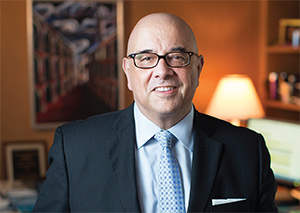Greetings from Northwestern Engineering
A message from Dean Ottino
 We live in a time of great challenges, which, to engineers, means we live in a time of great opportunity. This issue of the magazine is proof of that.
We live in a time of great challenges, which, to engineers, means we live in a time of great opportunity. This issue of the magazine is proof of that.
Our faculty members are not only looking to harness new energy sources—they are finding ways to make current energy sources more efficient, often in unexpected places. New materials for airplane turbines and oil lubricants could mean a big reduction in carbon emissions, and advances like these are needed now as we continue to transition to a sustainable future.
“That is why we focus on lifelong skills—a problem-solving toolkit—as well as a whole-brain way of thinking. We want our students and faculty not only to solve the problems we see, but to envision a future no one has thought of yet.”
Our undergraduate students are looking at new ways to frame and solve problems right from the start. They are conducting research in energy conversion, sustainable cities, and synthetic biology. Our Design for America students are designing ways to make cities more accessible for everyone. And our Engineers Without Borders students are traveling the globe, putting their engineering skills to use, and learning through practice that the first idea isn’t always the best.
One of our goals is to teach students to “think like an engineer.” There is no better example of this than Professor Luís Amaral. He has the ability to look at one system—for example, cells—and find the patterns that relate to another seemingly unrelated system—say, airports. More than that, Luís has the ability to connect with faculty across disciplines to look at old problems in new ways. The result is a new understanding of complex systems that could transform, in one sweeping move, a number of disciplines.
We are living in the period of fastest change in human history. Undoubtedly, once one problem is solved, another one will arise. No one has figured out how to predict the future or anticipate unintended consequences. That is why we focus on lifelong skills—a problem-solving toolkit—as well as a whole-brain way of thinking. We want our students and faculty not only to solve the problems we see, but to envision a future no one has thought of yet. We do that by creating a space that embraces a diversity of viewpoints and ideas. By connecting different fields and views, one can create something new. That, ultimately, is our goal: to encourage the people and ideas that will bring us beyond the horizon and put us into a future we cannot yet imagine.
Julio M. Ottino
Dean, McCormick School of Engineering and Applied Science
